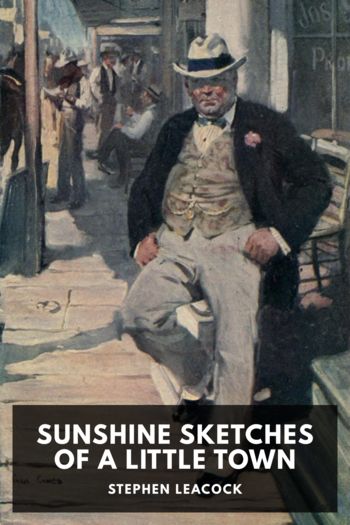Sunshine Sketches of a Little Town by Stephen Leacock (the false prince TXT) 📕

- Author: Stephen Leacock
Book online «Sunshine Sketches of a Little Town by Stephen Leacock (the false prince TXT) 📕». Author Stephen Leacock
Still more noticeable, perhaps, was the quiet, sallow looking man dressed in black, with black gloves and with black silk hat heavily craped and placed hollow-side-up on a chair. This was Mr. Golgotha Gingham, the undertaker of Mariposa, and his dress was due to the fact that he had just come from what he called an “interment.” Mr. Gingham had the true spirit of his profession, and such words as “funeral” or “coffin” or “hearse” never passed his lips. He spoke always of “interments,” of “caskets,” and “coaches,” using terms that were calculated rather to bring out the majesty and sublimity of death than to parade its horrors.
To be present at the hotel was in accord with Mr. Gingham’s general conception of his business. No man had ever grasped the true principles of undertaking more thoroughly than Mr. Gingham. I have often heard him explain that to associate with the living, uninteresting though they appear, is the only way to secure the custom of the dead.
“Get to know people really well while they are alive,” said Mr. Gingham; “be friends with them, close friends and then when they die you don’t need to worry. You’ll get the order every time.”
So, naturally, as the moment was one of sympathy, it was Mr. Gingham who spoke first.
“What’ll you do, Josh,” he said, “if the Commissioners go against you?”
“Boys,” said Mr. Smith, “I don’t rightly know. If I have to quit, the next move is to the city. But I don’t reckon that I will have to quit. I’ve got an idee that I think’s good every time.”
“Could you run a hotel in the city?” asked Mullins.
“I could,” said Mr. Smith. “I’ll tell you. There’s big things doin’ in the hotel business right now, big chances if you go into it right. Hotels in the city is branching out. Why, you take the dining room side of it,” continued Mr. Smith, looking round at the group, “there’s thousands in it. The old plan’s all gone. Folks won’t eat now in an ordinary dining room with a high ceiling and windows. You have to get ’em down underground in a room with no windows and lots of sawdust round and waiters that can’t speak English. I seen them places last time I was in the city. They call ’em Rats’ Coolers. And for light meals they want a Caff, a real French Caff, and for folks that come in late another place that they call a Girl Room that don’t shut up at all. If I go to the city that’s the kind of place I mean to run. What’s yours, Gol? It’s on the house?”
And it was just at the moment when Mr. Smith said this that Billy, the desk clerk, entered the room with the telegram in his hand.
But stop—it is impossible for you to understand the anxiety with which Mr. Smith and his associates awaited the news from the Commissioners, without first realizing the astounding progress of Mr. Smith in the three past years, and the pinnacle of public eminence to which he had attained.
Mr. Smith had come down from the lumber country of the Spanish River, where the divide is toward the Hudson Bay—“back north” as they called it in Mariposa.
He had been, it was said, a cook in the lumber shanties. To this day Mr. Smith can fry an egg on both sides with a lightness of touch that is the despair of his own “help.”
After that, he had run a river driver’s boardinghouse.
After that, he had taken a food contract for a gang of railroad navvies on the transcontinental.
After that, of course, the whole world was open to him.
He came down to Mariposa and bought out the “inside” of what had been the Royal Hotel.
Those who are educated understand that by the “inside” of a hotel is meant everything except the four outer walls of it—the fittings, the furniture, the bar, Billy the desk clerk, the three dining room girls, and above all the license granted by King Edward VII, and ratified further by King George, for the sale of intoxicating liquors.
Till then the Royal had been a mere nothing. As “Smith’s Hotel” it broke into a blaze of effulgence.
From the first, Mr. Smith, as a proprietor, was a wild, rapturous success.
He had all the qualifications.
He weighed two hundred and eighty pounds.
He could haul two drunken men out of the bar each by the scruff of the neck without the faintest anger or excitement.
He carried money enough in his trousers pockets to start a bank, and spent it on anything, bet it on anything, and gave it away in handfuls.
He was never drunk, and, as a point of chivalry to his customers, never quite sober. Anybody was free of the hotel who cared to come in. Anybody who didn’t like it could go out. Drinks of all kinds cost five cents, or six for a quarter. Meals and beds were practically free. Any persons foolish enough to go to the desk and pay for them, Mr. Smith charged according to the expression of their faces.
At first the loafers and the shantymen settled down on the place in a shower. But that was not the “trade” that Mr. Smith wanted. He knew how to get rid of them. An army of charwomen, turned into the hotel, scrubbed it from top to bottom. A vacuum cleaner, the first seen in Mariposa, hissed and screamed in the corridors. Forty brass beds were imported from the city, not, of course, for the guests to





Comments (0)